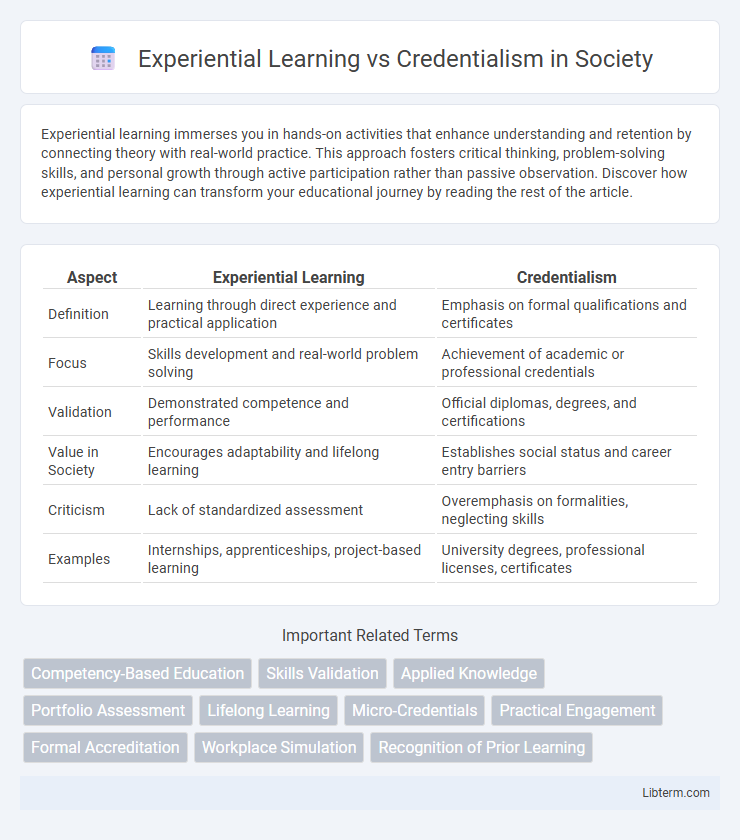Experiential learning immerses you in hands-on activities that enhance understanding and retention by connecting theory with real-world practice. This approach fosters critical thinking, problem-solving skills, and personal growth through active participation rather than passive observation. Discover how experiential learning can transform your educational journey by reading the rest of the article.
Table of Comparison
| Aspect | Experiential Learning | Credentialism |
|---|---|---|
| Definition | Learning through direct experience and practical application | Emphasis on formal qualifications and certificates |
| Focus | Skills development and real-world problem solving | Achievement of academic or professional credentials |
| Validation | Demonstrated competence and performance | Official diplomas, degrees, and certifications |
| Value in Society | Encourages adaptability and lifelong learning | Establishes social status and career entry barriers |
| Criticism | Lack of standardized assessment | Overemphasis on formalities, neglecting skills |
| Examples | Internships, apprenticeships, project-based learning | University degrees, professional licenses, certificates |
Understanding Experiential Learning
Experiential learning emphasizes acquiring knowledge through hands-on, real-world experiences rather than traditional academic credentials, fostering practical skills and critical thinking. This approach engages learners in active problem-solving, reflection, and adaptation, which enhances retention and application of knowledge in diverse contexts. Understanding experiential learning reveals its value in bridging the gap between theoretical knowledge and workplace readiness, challenging the conventional emphasis on formal qualifications in credentialism.
Defining Credentialism in Modern Education
Credentialism in modern education emphasizes formal qualifications and certificates as primary indicators of skill and competence, often overshadowing practical experience and hands-on learning. This approach prioritizes diplomas and degrees over real-world problem-solving abilities, leading to a focus on credential acquisition rather than mastery of applicable knowledge. The growing importance of credentialism impacts hiring practices, driving institutions and employers to value documented credentials over experiential learning outcomes.
Key Differences Between Experience and Credentials
Experiential learning emphasizes acquiring skills and knowledge through direct involvement and practical application, fostering critical thinking and adaptability. Credentialism prioritizes formal qualifications and certifications as proof of competence, often valuing standardized education over hands-on experience. The key difference lies in experiential learning's focus on real-world problem-solving abilities, whereas credentialism relies on documented academic achievements to validate expertise.
The Value of Hands-On Experience in the Workplace
Hands-on experience in the workplace enhances practical skills and problem-solving abilities, often leading to higher job performance and adaptability compared to solely credential-based qualifications. Employers increasingly value experiential learning as it fosters real-world competencies, critical thinking, and teamwork, which are essential for effective decision-making and innovation. Studies show that employees with significant experiential backgrounds contribute to faster onboarding processes and improved organizational outcomes.
Credentials: Gatekeeping or Quality Assurance?
Credentials serve as a primary gatekeeping mechanism in professional fields, establishing standardized benchmarks for knowledge and skills that help employers assess candidate quality efficiently. While credentialism can limit access by emphasizing formal qualifications over practical experience, it also provides quality assurance by ensuring individuals meet minimum competency standards. The challenge lies in balancing credential validation with recognition of experiential learning to create inclusive yet reliable entry criteria.
Impact on Career Advancement and Employability
Experiential learning enhances career advancement by providing practical skills and real-world problem-solving abilities highly valued by employers, often leading to faster job promotion and adaptability in dynamic industries. Credentialism emphasizes formal qualifications, which can open initial job opportunities but may not guarantee long-term employability without complementary hands-on experience. Balancing experiential learning with recognized credentials creates a competitive edge, increasing both immediate employability and sustained career growth.
Case Studies: Success Without Formal Credentials
Case studies highlight numerous successful entrepreneurs and industry leaders who leveraged experiential learning to excel despite lacking formal credentials, demonstrating that practical skills often outweigh academic qualifications. Companies such as Apple's Steve Jobs and Richard Branson's Virgin Group validate the effectiveness of hands-on experience and innovation in driving business growth. Research from the National Bureau of Economic Research supports that real-world problem solving and adaptive learning contribute significantly to career advancement and leadership success.
Balancing Experience and Certification in Hiring
Balancing experiential learning and credentialism in hiring emphasizes evaluating candidates based on practical skills demonstrated through real-world experience alongside verified certifications. Employers increasingly recognize that hands-on problem-solving and adaptability gained through experiential learning can complement formal qualifications, leading to more effective job performance. Integrating both approaches ensures a comprehensive assessment of a candidate's capabilities, aligning talent acquisition with organizational needs and industry standards.
The Role of Technology in Shifting Learning Paradigms
Technology accelerates the shift from credentialism to experiential learning by enabling immersive, hands-on learning through virtual labs, simulations, and augmented reality, which provide practical skills beyond traditional certificates. Online platforms and AI-driven personalized education adapt to individual learning styles and real-world problem-solving, challenging the primacy of formal credentials. This transformation fosters skill acquisition and competency validation in dynamic, tech-enabled environments, redefining how expertise is recognized and valued in the modern workforce.
Future Trends: Integrating Experience and Credentials
Future trends in education emphasize integrating experiential learning with formal credentials to enhance workforce readiness and adaptability. Hybrid models combining hands-on experience, such as internships and apprenticeships, with recognized certifications are gaining traction across industries. This approach addresses employer demand for both practical skills and validated qualifications, fostering lifelong learning and career mobility.
Experiential Learning Infographic

 libterm.com
libterm.com